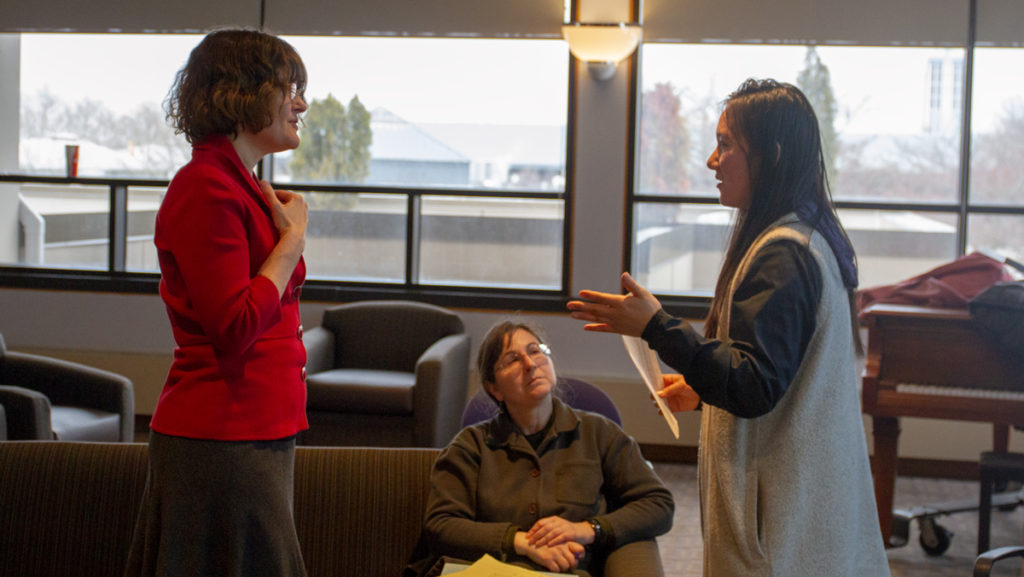Ithaca College’s Strategic Planning Steering Committee hosted three interactive brainstorming sessions titled “Themes Idea Generation” on Feb. 25, 26 and 28. The sessions were open to all members of the campus community to share their feedback and ideas about what the college should be pursuing in the strategic plan.
Approximately 40 people attended both the Feb. 25 session in Clarke Lounge and the Feb. 26 session in Klingenstein Lounge. Approximately 20 people attended the Feb. 28 session in the Taughannock Falls Room. The goal of these sessions was to generate ideas about the themes for the strategic plan and receive feedback from the community about the recently released draft themes. Each of the sessions was structured the same and designed to receive feedback from the community about what it believes is important for the college to address in the strategic plan.
The strategic plan is currently in its design phase and once completed will serve as a guiding roadmap for the college’s future initiatives.
Participants were sectioned off into three groups within each session to further explore ideas related to the three themes and what the college can do to address these ideas. The three themes are Investment in People, Place, Planet; Interconnections Among Disciplines, Schools, Partners; Evolution of Students, Curriculum, College. The groups also contained members of the working groups, who helped facilitate discussions and record ideas.
Each of the different groups at the sessions was tasked with developing a goal and objective for each theme and steps or ideas for how the college can reach that goal. The working groups and committee will take the ideas generated from these sessions into account when moving forward with developing the strategic plan.
The Strategic Planning Steering Committee, which is tasked with completing the strategic plan process and is composed of faculty, staff, students and trustees, emphasized in its beginning presentation that a key to success in these sessions was for them to be truly inclusive processes. The committee wanted to be sure the strategic planning process represented multiple voices from the community in order to build trust through a transparent process.
The committee raised questions to the groups: how would Ithaca College students, faculty and staff like to see the college evolve, where should the college focus its energy for the future and how can the college become more connected with local schools and communities?
During one discussion in the Feb. 25 session, a group came to an agreement regarding the investment theme that the campus is not being used to its full capacity. The group members said they want more accessibility on campus through adding more elevators. They said they wanted a better alternative energy presence and updated buildings that offer year-round events, air conditioning and adult education.
During the Feb. 26 session, one group talked about possibly incorporating a physical therapy clinic on campus that people in the college community could pay for. Another group talked about making college tours more accessible to incoming students who may not have the means to travel to the college, either through offering funding opportunities or developing technology that would allow for virtual tours.
At the Feb. 28 session, ideas related to getting different schools at the college to connect better, creating more spaces on campus for students to study or relax in and expanding the colleges reach to buildings in downtown Ithaca were discussed by groups.
Jason Freitag, presidential fellow and a co-chair for the Strategic Planning Steering Committee, said getting the word out about the strategic planning process is vital to the committee.
“We’ve spent tremendous amounts of time thinking about how to get people in the room and how, not to get them in the room, but how to get to where they are,” Freitag said. “We’re trying as best we can — moving things at different times of day, different locations — we can do more about being in other people’s faces, reaching out to clubs and things like that.”
Greg Lischke, director of energy management and sustainability, said he felt the idea sessions were engaging and successful. He said he would have liked more student voices present in the session.
“I would have ideally liked to see more students involved,” he said. “A couple students at our table spoke to that — how do you increase student engagement and participation? I think the students would be more able to help us decide on what we need to do for future generations.”
Sophomore Chanelle Ferguson, who attended the Feb. 28 session, said she hopes the changes that are made in the strategic planning process as a result of these sessions take diversity into account.
“For me, it was just to find ways to represent students of color on campus because many students feel like they’re not heard and resources and support is not designed for them,” Ferguson said. “When we gathered together, people are open to hearing whatever I had to say.”
Freitag said the theme ideas generated from these sessions will be given to the Strategic Planning Steering Committee and working groups. The working groups will look at the goals and objectives and apply them to what they are already thinking, and the committee will look for patterns in the qualitative data.
According to Imagining Ithaca, the committee’s website, the Strategic Planning Steering Committee is on schedule for developing the strategic plan, as the “Community and Steering Committee Feedback Period” is scheduled to run from January to May of 2019.
Staff Writers Sam Haut and Cody Taylor contributed reporting.








